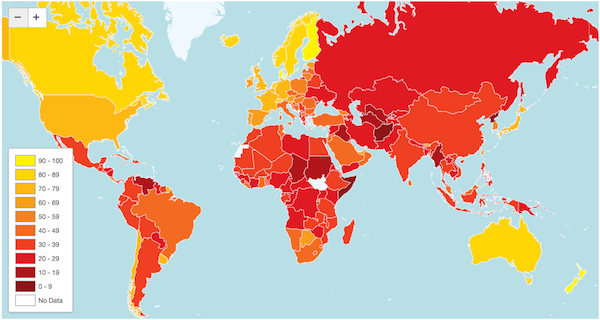
A visual representation of the results of Transparency International’s 2012 Corruption Perceptions Index (author’s screenshot from the TI website).
How corrupt is your government? This week, Transparency International released its annual Corruption Perceptions Index, a measure of “perceived levels of public sector corruption in countries worldwide.” Some results are simply unsurprising: out of 176 countries, war-torn Afghanistan and Somalia, and opaque, impoverished North Korea share the bottom spot. Meanwhile, Denmark, Finland, and New Zealand, often lauded for good governance, share the top spot.
As its name suggests, the Index takes into perceptions of corruption, but is not a measure of corruption itself, a detail I find is often forgotten in discussions of the Index. Nevertheless, when it comes to a government’s legitimacy and effectiveness, perceptions are of course an important part of the equation, and arguably, perceptions (more than quantitative measures) play a disproportionate role in determining elections, driving revolutions, and more.
How are some of the world’s newest democracies doing? While some analysts are disappointed with the general lack of progress among Arab Spring countries in reducing perceived corruption, we need to give these countries more time. As the fury in Egypt over executive power and the new constitution suggests, citizens of that country care deeply about building an accountable government that is responsive to their demands. Democratic transition does not take place overnight, however. While it’s possible to imagine ways in which the Egyptian democratic transition could be going more smoothly, it is impossible to evaluate Egypt’s progress on corruption in the same way that one could evaluate most countries – the current Egyptian government has been in power for less than a year.
As newspapers around the world discuss their own countries’ rankings, I was eager to see how the United States measures up. The U.S.—an active promoter of good governance initiatives overseas—is ranked 19th, meaning that Denmark, Finland, New Zealand, Sweden, Singapore, Switzerland, Australia, Norway, Canada, the Netherlands, Iceland, Luxembourg, Germany, Hong Kong, Barbados, Belgium, Japan, and the United Kingdom are all doing better than this country. While comparing this year’s results to previous years’ is not straightforward because of the way that Transparency has changed some of its methodology and reporting, the significance of this ranking is unignorable.
I predict that in 2013, the commentariat and politicians here in the U.S. will continue to talk about so-called U.S. decline in comparison to China, the state of U.S. infrastructure, U.S. rankings in education, and more. I hope that talk of “nation building at home” and “restoration” also includes discussion of the Corruption Perceptions Index – why the U.S. is at number nineteen, and how it can begin moving up the rankings.
Note: For another take on corruption and the Index, check out this post by FPA’s Scott Firsing.